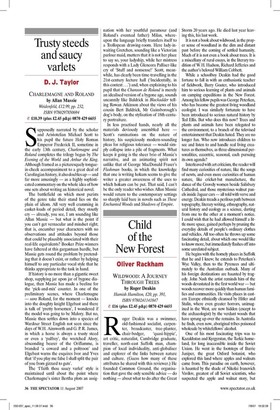Trusty steeds and saucy varlets D. J. Taylor CHARLEMAGNE AND
ROLAND by Allan Massie Weidenfeld, £12.99, pp. 232, ISBN 9780297850694 £1039 (plus £2.45 p&p) 0870 429 6655 Supposedly narrated by the scholar and Aristotelian Michael Scott to his pupil the future Holy Roman Emperor Frederick II, sometime in the early 13th century, Charlemagne and Roland completes the trilogy begun by The Evening of the World and Arthur the King. Although framed as a picturesquely tonguein-cheek accompaniment to a great deal of Carolingian history, it also doubles up — and far more amusingly — as a highly sophisticated commentary on the whole idea of how one sets about writing an historical novel. The battlefield on which most purists of the genre take their stand lies on the plain of idiom. All very well cramming in casket-loads of period detail, they stoutly cry — already, you see, I am sounding like Allan Massie — but what is the point if you can't get vernacular and mindset right; that is, encumber your characters with no observations and attitudes beyond those that could be plausibly associated with their real-life equivalents? Booker Prize-winners have faltered at this gargantuan hurdle, but Massie gets round the problem by pretending that it doesn't exist, or rather by helping himself to any particular vocal style that he thinks appropriate to the task in hand. If history is no more than a gigantic sweet shop, supplying jar upon jar of bygone dialogue, then Massie has made a beeline for the 'pick-and-mix' counter. In one of the preliminary scenes, where Charlemagne — sans Roland, for the moment — knocks into the doughty knight Elgebast and there is talk of 'pretty horsemen', I wondered if the model was going to be Malory. But no, Massie then settles down into a species of Wardour Street English not seen since the days of W. H. Ainsworth and G. P. R. James, in which a horse is always a trusty steed or even a 'palfrey', the wretched Alory, absconding bearer of the Oriflamme, is branded 'a coward and a poltroon' and Elgebast warns the esquires Ivor and Yves that `if you play me false I shall split the pair of you from gizzard to guts'. The Tfaith thou saucy varlet' style is maintained until about the point where Charlemagne's sister Bertha plots an assig nation with her youthful paramour (and Roland's eventual father) Milan, whereupon the language briefly transfers itself to a Trollopean drawing-room. Here lady-inwaiting Gretchen, sounding like a Victorian parlour maid, mutters that it is not her place to say so, your ladyship, while her mistress responds with a Lady Glencora Palliser-like cry of 'Stuff and nonsense!' Scott, meanwhile, has clearly been time-travelling in the 21st-century lecture hall (Incidentally, in this context ...') and, when explaining to his pupil that the Chanson de Roland is merely an idealised version of a bygone age, sounds uncannily like Baldrick in Blackadder telling Rowan Atkinson about the views of his cousin Bert Baldrick, Mr Gainsborough's dog's-body, on the stylisation of 18th-century portraiture. In less practised hands, nearly all the materials deviously assembled here — Scott's ruminations on the nature of history, his suspiciously modern-sounding pleas for religious tolerance — would simply collapse into a pile of fragments. What keeps it going is the sheer brio of Massie's narrative, and an animating spirit not unlike that of George MacDonald Fraser's Flashman books, in which the knowledge that one is writing hokum seems to give the writer a greater awareness of the uses to which hokum can be put. That said, I can't be the only reader who wishes Allan Massie would return to the contemporary settings so sharply laid bare in novels such as These Enchanted Woods and Shadows of Empire.









































 Previous page
Previous page